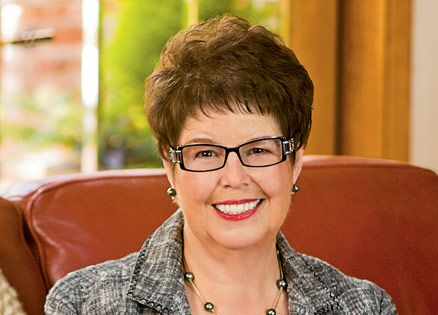The following interview first appeared on Bookish.com, and is used here with permission.
If you don't think that God has much of a place in romance novels, then you haven't spoken with beloved storyteller Debbie Macomber. In her new book Once Upon a Time: Discovering Our Forever After Story, she tries to help her readers understand their lives—and even their connection to her work—as a continuous story written by God. Macomber tells Bookish how she credits the Big Guy with everything from meeting her husband to finding the perfect word.
Bookish: Why do you think it is so important for people to find their own story?
Debbie Macomber: Because I'm a storyteller, let me start with how I met my husband. I was living and working in Seattle and sharing a large house with seven other girls. Saturday night we all had dates, but mine phoned and cancelled at the last minute. Here I was—dressed, ready to go and without a date. Then the phone rang and it was Wayne. He asked for one of my roommates, and when I explained that she was out for the night, he hesitated and asked if I was doing anything. We were married a year later.
Looking back, I can see how God arranged for me to meet Wayne. Without my husband's love and support, I don't know if I would have ever been able to write. When we look for our own story, it becomes apparent how God has worked in our lives, how He has been in control.
Bookish: Where can people find inspiration for their story?
DM: It's all around us. When a child or grandchild asks what it was like "in the old days," that's inspiration. It's like a conversation: Someone tells of an incident in his or her life and it reminds us of something similar. Many people are like me—inspiration comes when we are holding our pen and writing in a journal.
Every time you think, "That reminds me…" be prepared for the story that will follow.
Bookish: Do you have a muse?
DM: If by muse you mean one person who has inspired my writing, then no. The Holy Spirit, of course, is far more than a muse—He's the one who births ideas and understanding. But, as far as muses, I'm inspired by the writing of so many who've gone before me—those authors I've talked about in my books. The ones whose autographs and photos line the walls of my office.
But my real muses are my readers. I can't tell you how many times a reader has told me a story that ends up sparking something for one of my books.
Bookish: What's the thing you've written that you were most concerned fans and readers wouldn't appreciate? What do you think it is about your writing that makes your books so popular?
DM: Actually, I think there are several factors, the most important being prayer. Before I write, I ask God to guide my words and my story; I pray that my readers will resonate with the characters and come away feeling uplifted and hopeful about life.
God gave me the gift of storytelling. Sometimes words get in the way. When I write, it isn't important to pause in the action to relay a lot of description. I want to tell the story. One time I wrote an entire book without once describing the heroine. My editor asked me to go back and fill in a few details, which I did. After the book was published, I received a letter from a reader who said she absolutely loved the way I described my characters. I was stunned because I use such little description. What I learned from her letter is that once readers get involved in the story, their minds automatically fill in the details.
Bookish: Do you want to make your readers cry when reading your novels? Do you cry when writing your own novels?
DM: In my 30-plus years as an author, I've discovered that there is an emotional—almost spiritual—link between the author and the reader. If I cry creating a scene, my readers will experience that same emotion. If I laugh, they will laugh. If I put my heart on the page, it will link with theirs.
Do I laugh? Yes. Do I cry? Yes. And my heart is on every single page.
Bookish: What's something about you that your fans would find surprising?
DM: There are times I feel as if I've already laid it all there—telling my stories in both fiction and nonfiction—but what seems to catch most readers by surprise is the fact that I'm dyslexic and grew up hearing nothing but negative feedback when I shared my dream of becoming a writer.
Bookish: Which authors do you find inspiring? If you could give an aspiring author one piece of advice what would it be?
DM: First of all, I explain that a writer writes. We don't spend our time telling everyone we're going to be writers. Nor do we brag about what great plots we have or broadcast that one day our names are going to be on a bestselling novel. We write every single day. This isn't an easy occupation. Selling my first book was one of the hardest achievements of my life. My books got rejected so fast they hit me in the back of my head on my way home from the post office. If you think selling your book will be easy then, by comparison, being a brain surgeon is a snap.
Write. Believe in yourself. Face rejection with a positive heart. Trust God to lead you.
Bookish: What is the single greatest love story of all time?
DM: I love easy questions. Thank you. The greatest love story of all time is the love God has for each one of us. For God so loved the world that He gave us Jesus so that we can walk straight through the gates of heaven. (Talk about golden arches!)






